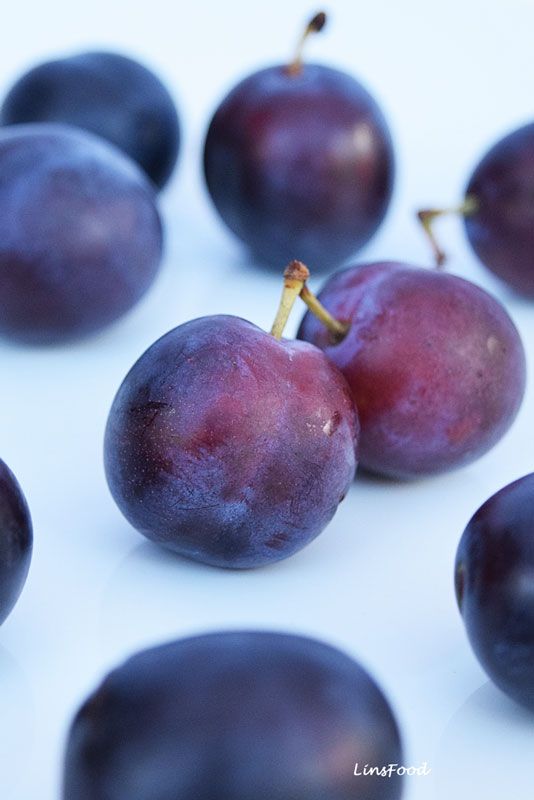Know the health benefits, nutritional profile, facts, myths and frequently asked questions about Damson fruit on taazafruithub. This fruit is slightly sour and delicious in taste. Not only this, but by consuming this fruit, your body gets natural nutrition. To know all this, come and read our post.

Table of Contents
What is Damson Fruit?
Damson is a type of small sour plum belonging to the species Prunus domestica subsp. insititia. Its color is deep purple or indigo blue and the flesh is yellow-green. Damson is said to have originated around Damascus in Syria, and for centuries it has been widely cultivated specially in Europe and United Kingdom. The fruit is small and more oval in shape compared to other plums. The fruit is mostly used for cooking and preserving rather than eating as it has a very bitter taste.Generally, this fruit ripens in late summer to early autumn, depending on the variety and location.

Nutritional Profile:
Here’s breakdown of nutritional profile of damson fruit per 100grams:
| Macro-Nutrients | Value |
| Calories | 46 kcal |
| Carbohydrates | 11.4 g |
| Sugars | 9.9 g |
| Dietary Fiber | 1.4 g |
| Protein | 0.5 g |
| Fats | 0.2 g |
| Vitamins | Value |
| Vitamin C | 6 mg (10% DV) |
| Vitamin K | 0.0065 mg (8% DV) |
| Vitamin A | 17 IU |
| Minerals | Value |
| Potassium | 157 mg |
| Calcium | 8 mg |
| Iron | 0.2 mg |
| Magnesium | 7 mg |
Damson is low in calories and fats, providing a good source of vitamins, minerals, and dietary fiber.
Health Benefits of Damson Fruit:
Damson fruit is a type of plum that contains a lot of nutrients that provide several health benefits. Here are some of the health benefits of damson fruit:
1) Rich in Antioxidants: Damson is rich in antioxidants and contains phenolic compounds. The antioxidants present in it help protect against free radicals which may reduce the risk of heart disease and cancer.
2) Good for Digestion: The dietary fiber in damson helps in building healthy digestion. Regular consumption of this fruit helps in preventing constipation and maintaining a healthy gut Microbiome.
3) Enhances Immune System: Vitamin C found in damson fruit plays an important role because this nutrient strengthens the immune system, helping the body to fight off infections and diseases effectively.
4) Weight Loss: Being low in calories and high in fiber, damson fruit can be a great addition to a weight management plan as it is high in fiber and helps you feel full. For those who want to lose weight, this fruit is a good option for weight loss as it is low in calories.
5) Skin Health Improvement: The antioxidants found in damson fruit, especially vitamin C, promote the production of collagen, which protects the skin from oxidative stress and reduces wrinkles and fine lines.
6) Cardiovascular(Heart) Health: The potassium content in damson fruit helps in controlling blood pressure, reducing the risk of stroke and heart related diseases. Due to the high fiber content, damson fruit helps in reducing cholesterol levels.
7) Anti-Inflammatory Properties: Consuming damson fruit can reduce inflammation in the body and may also help in treating conditions like arthritis as it is rich in phenolic compounds and antioxidants.
8) Improve Bone Health: Eating damson fruit helps in keeping your body’s bones strong and helps in reducing conditions like osteoporosis as it contains calcium which is known to strengthen bones.
Adding damson fruit to your diet can provide you with all of these health benefits and is a great alternative to sweet and tart flavor in your meal.
Risks and Considerations:
Although damson fruit has many health benefits, it does not mean that it has no risk considerations. Here are its risk considerations that we should keep in mind:
1) Allergic Reactions: It is rare but true that some people may have allergies to damson fruit or any other member of the plum family, such as itching, swelling, breathing problems and gastrointestinal problems. If you notice any of these symptoms, consult a doctor immediately.
2) High Sugar Content: Damson fruit contains natural sugar, but it is a healthy source of sugar, but consuming it in excess can lead to weight gain and it is important to the people who are suffering from diabetes and want to control blood sugar levels should consume this fruit in limited quantity. It is a delicious fruit, so eat it in limited quantity to enjoy it.
3) Digestive Problems: It is believed that damsons are rich in fiber which is generally good for digestion but excessive consumption of fiber can cause digestive problems such as bloating, gas or diarrhea. It is important to note that people with sensitive digestive systems should start consuming this fruit gradually.
4) Oxalates Content: Oxalates are found in damson fruit which can cause kidney stones in susceptible people. People who have a history of kidney stones should consume this fruit in limited quantity.
5) Cyanogenic Compounds in Seeds: Like other stone fruits, damson seeds contain cyanogenic compounds that can release cyanide if chewed or crushed. It is very important to avoid eating the seeds, as cyanide is poisonous and can be harmful, specially in large quantities.
6) Interactions with Medications: Damson fruit may interact with certain medications, especially those that affect blood sugar levels or blood pressure. If you are taking medications for these conditions, consult your healthcare provider before adding damson to your diet.
7) Potential for Weight Gain: Although damson fruit is low in calories, its sugar content and the tendency to consume it in processed forms like jams or desserts can contribute to weight gain if not eaten in moderation.
By being mindful of these risks and considerations, you can enjoy the health benefits of damson fruit while minimizing any potential downsides.
Facts:
Here are some facts that you must know:
1) Origin and History: It is said that the Damson fruit originated in Damascus, located in Syria, and was brought to Europe by the Romans. The word “Damson” was derived from “Damascene,” which refers to its place of origin.
2) Botanical Classification: Damson is a subspecies of the European plum, scientifically known as Prunus domestica subspecies insititia. It belongs to the Rosaceae family, which includes other fruits such as apples, cherries, and peaches.
3) Appearance: Damson fruits are typically small, oval-shaped, and have a deep purple or indigo skin. The flesh is yellow-green, firm, and clings tightly to the stone (pit).
4) Cultural Significance: In British folklore, damson trees are believed to be protective and so people planted these trees in their yards to ward off evil spirits. The fruit was also important as a source of food during harsh winters.
5) Harvest Season: Damson fruit usually ripens from late summer to early autumn but its peak harvesting period is from August to September.
6) Varieties: There are several varieties of damson, including the Shropshire Prune, Farleigh, and Merryweather, each with slightly different characteristics in terms of flavor and size.
7) Ecological Role: Damson trees are very beneficial to wildlife, providing food for birds and insects. The flowers attract pollinators such as bees, making them valuable in maintaining the local ecosystem.
These facts highlight the rich history, cultural significance, and versatility of damson fruit.
Myths:
Here are some myths and misconceptions about damson fruit:
1) Myth: Damson Fruit Causes Hallucinations: There is a myth that eating damson fruit can cause hallucinations. This likely stems from confusion with other plants in the nightshade family that may have psychoactive properties. In fact, damson fruit is perfectly safe to eat and does not cause any such effects.
2) Myth: Damson Trees Bring Bad Luck: In other cultures, there is a superstition that planting Damson trees will bring misfortune or misfortune to the house. This is a myth. The truth is that planting this tree in the courtyard of the house helps in warding off evil spirits. It is believed that this tree is safe.
3) Myth: Damson Fruit is Poisonous: Some people believe that the damson fruit is poisonous because it tastes bitter and tart when raw. This is a false belief. While the seeds contain cyanogenic compounds like other fruits, the pulp of the fruit is safe to eat and does not cause any harm if consumed in normal quantities.
4) Myth: Damson Fruit Can Cure All Illnesses: In some folklore, it is believed that it attracts evil spirits and because of this the tree is avoided in some areas. This is a myth because people believe that the tree’s dark, mysterious appearance attracts evil spirits, but there is no basis for this in reality.
5) Myth: Damson Fruit Can Cure All Illnesses: There is also a myth that Damson fruit can cure from digestive issues to serious diseases like cancer. While it is believed that the fruit is beneficial for health, it does not mean that it will cure serious problems; rather it is a fruit to be eaten as part of a balanced diet.
FAQ’s:
1) What is the difference between a plum and a damson?
Yes there is a difference between plums and damsons but the comparison is not about taste but about size. Most plums are larger than damsons and have a distinct longitudinal groove. Damsons also freeze well but plums do not. Plum trees need large plant containers with a volume of at least 25 liters.
2) Can you eat raw damsons?
Yes, damson fruits can be eaten raw, but they are quite sour and astringent, which may not be to everyone’s liking. While some people enjoy the tart flavor of raw damson fruits, they are more commonly used in cooking and preserving, where their tartness can be balanced with sugar or other ingredients.